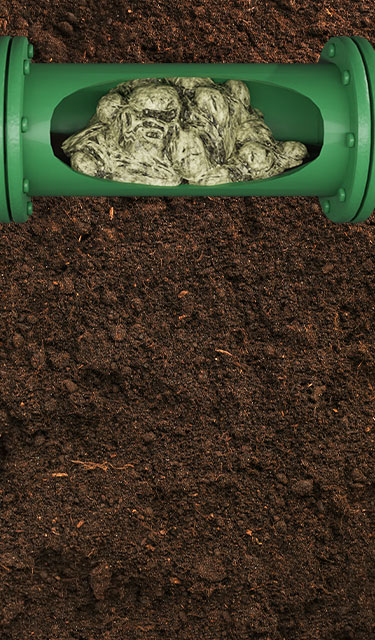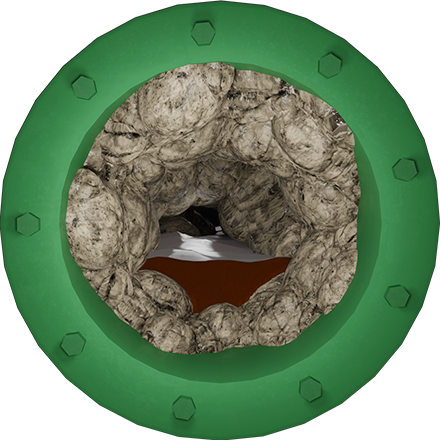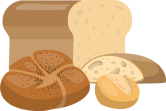Pipes


Do you know what goes on inside our sewer system? When it comes to sewer backups, our Pipes Don’t Lie! They show us exactly what clogged them. Here you’ll learn more about the different causes of sewer backups, and how you can be part of the solution!

Challenges to Our
Sewer System
One of the biggest challenges to our sewer system is pre-moistened personal use and cleaning wipes. Even though most claim to be flushable, in reality, these wipes don’t disintegrate like traditional toilet paper. Wipes bunch together with grease and debris, creating long, mop-like clumps that then clog our pipes and damage the sewer system. We know wipes can be convenient and handy, but never flush them down the toilet.
- The toilet is not a trash can.
- Only the 3-Ps belong in the toilet: pee, poop and (toilet) paper.
- Throwing things in the toilet other than the 3-Ps can damage sewer infrastructure and cause backups into your home or business. The results can be messy, smelly and costly.
What Not to Put Down the Drain
In addition to fats, oils and grease found in your favorite foods, products such as wipes can also cause our pipes to clog. Below are examples of what not to put down the drain:

Baked Goods
Butter

Chicken Skins

Creams & Sauces

Frosting

Milk

Salad Dressing
Ice Cream
How To Help Our Pipes

POUR
cooled liquid grease into a sealable container.

CLEAN
remaining grease and debris with a paper towel.

DISPOSE
of wipes and grease in your brown city trash bin.
The Ugly Side
Remember that our Pipes Don’t Lie! There are many reasons why you wouldn’t want pipes getting clogged around the city: everything from smelly streets, environmental impact, and backups into your home/business to harmful bacteria/diseases that can affect everyone. Please do your part and keep our community clean and clog-free!
Frequently Asked Questions
Why is SAWS so concerned about fats, oils and grease in our sewer system?
Fats, oils and grease account for nearly 70 percent of our sewer blockages and overflows, creating a potential public health hazard. Whether it’s an 8-inch residential line or a 3-foot sewer main, grease can accumulate and block them all.
What exactly makes fats, oils and grease a hazard to our sewer pipes?
When disposed of down the drain, fats, oils and grease congeal and stick to the sewer pipes – much like cholesterol does to heart arteries. Over time, the pipes will clog, causing unsightly and very costly sanitary sewer overflows.
Is grease just considered cooking oil?
Grease is more than just oil or melted butter. It also comes from dairy foods such as milk. It’s in the goo that you pour out of the top of your canned goods after opening them. It includes peanut butter, fried foods, salad dressing, cooking lard for baking and even that delicious frosting on your cake. If it contains fats of any kind, those fats will be released as it decomposes and will clog our pipes.
Where is the problem in San Antonio?
Grease in our sewer system is a citywide issue, which means we can all be part of the solution by practicing good disposal habits.
What’s the proper way to dispose of fats, oils and grease?
Use a disposable container to collect cooled grease and fats, such as an empty milk carton or a frozen juice container. (Make sure you use a container that won’t melt or deteriorate.) Keep it nearby, so it’s handy when ready to dispose of larger amounts of oils and grease. When full, dispose of it in the garbage or take it to the City of San Antonio Household Hazardous Waste Drop-Off Center, 7030 Culebra Road.
For smaller amounts of grease, absorb/wipe with a paper towel and simply toss it into the garbage.
Can’t I just pour the grease down the drain and dilute it with hot water or use the garbage disposal to disperse it?
No. The grease will simply re-congeal when it hits the cooler waters in the sewer system and start the process of clogging the pipes.
Also, using a soap/detergent that claims to dissolve grease is not a solution. It simply emulsifies the grease until the temperature cools, allowing it to re-congeal in our pipes.
Why should I care if it’s not my pipe?
Grease can cause sewage to back into neighborhood streets and even into your home via drains. And as stated before, it’s also a cost issue.
SAWS crews do routine maintenance using power washers and cameras to inspect sewer pipes, ensuring they are working properly. But emergencies require extra manpower and other resources, especially if a pipe repair or replacement is needed.
Construction isn’t cheap, and SAWS is already doing a lot of work to maintain and replace aging sewer infrastructure. Preventing overflows keeps costs to our customers to a minimum.
What are restaurants doing to prevent overflows? They produce a lot of grease.
We are currently working with restaurants and the San Antonio Restaurant Association. Restaurants and other commercial food preparation companies are required by city ordinance to use grease traps and properly dispose of oil and grease products in an approved container. If they don’t, they can be fined and have legal action brought against them. Effective Jan. 1, 2012, the ordinance also increases inspections from once every three years to once per year and includes a two-tiered fee for food establishments. SAWS is working with businesses in the food and restaurant industry to keep owners and employees up-to-date on proper grease disposal.
What else can I do to help?
Educate your children, family and friends about the importance of proper grease disposal. Let’s listen to our pipes and make sure our homes, neighborhoods and community are clog-free!
